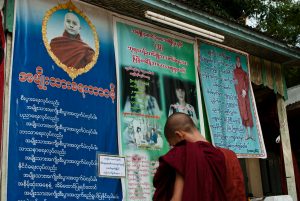In a curious turn of events, a hardline Buddhist monk turned himself in to the authorities in Myanmar, 18 months after his arrest was ordered – and less than a week before the country holds national elections.
According to a report by Agence France-Presse, Ashin Wirathu presented himself to police on November 2. He said that the government had “forced me into this situation,” calling on Myanmar citizens to vote against Aung San Suu Kyi and her “evil” National League of Democracy (NLD) government at the November 8 election. “I will go to the police and do whatever they ask of me,” he was quoted as saying, before reportedly climbing into a taxi.
During Myanmar’s political opening in 2011 and 2012, Wirathu, whom TIME magazine once dubbed the “the face of Buddhist terror,” breached the international consciousness as a purveyor of a volatile cocktail of ethnic Burman chauvinism and Buddhist ultra-nationalism. Via his public sermons and messages posted on his Facebook page, the 52-year-old helped inflame hatred against Muslims in general, and Rohingya Muslims in particular. Wirathu’s notoriety led Facebook to ban him from its platform in 2018.
When I interviewed Wirathu at Mandalay’s Masoeyein monastery in 2015, he outlined a Muslim plot to convert the world through rapid population. If the Rohingya were accepted as citizens of Myanmar, he said, it “might become a wholly Muslim country, like Pakistan or Bangladesh.”
In August 2017, the Myanmar military launched a clearance operation in northern Rakhine State that forced more than 700,000 Rohingya over the border into Bangladesh. The United Nations reported that the assaults constituted ethnic cleansing and possibly genocide.
Wirathu faded from public view around the time of the national election of November 2015, which saw a historic and lopsided victory for Aung San Suu Kyi and the NLD. During the campaign he had attempted to mobilize popular sentiment against Aung San Suu Kyi, depicting her as a stooge of shadowy Muslim interests, a sentiment that failed to gain much traction – but seemed to confirm suspicions that he enjoyed the backing of senior members of the military.
In 2017, the State Sangha Maha Nayaka Committee, Myanmar’s highest Buddhist authority, banned Wirathu from preaching for one year, because he “repeatedly delivered hate speech against religions to cause communal strife and hinder efforts to uphold the rule of law.” Once the ban expired, however, he once returned to the fray, making regular appearances at pro-military rallies, accusing the NLD government of corruption and calling for boycotts of Muslim businesses.
Eventually, it was Wirathu’s defamatory comments about Aung San Suu Kyi and her government, rather than his anti-Muslim hate speech, that prompted the police to order his arrest in May 2019. He was charged with sedition, which Myanmar’s legal code defines as “attempts to bring into hatred or contempt, or excites or attempts to excite disaffection towards the government.” The charge carries a maximum sentence of three years’ prison.
According to Richard Horsey, a Myanmar-based analyst for the International Crisis Group, Wirathu’s move was a clear attempt to influence the result of the election on November 8. “By grabbing headlines just before elections [he] will hope to portray the NLD government as the enemy of Buddhist nationalism,” Horsey told AFP, adding that the monk was unlikely to have much success.
Indeed, given that the former human rights icon enjoys staggering levels of popularity among the country’s ethnic Burman majority, in part for defending Myanmar against international charges of genocide connected to the Rohingya crisis, it is difficult to see how she could be successfully outflanked on the right.

































